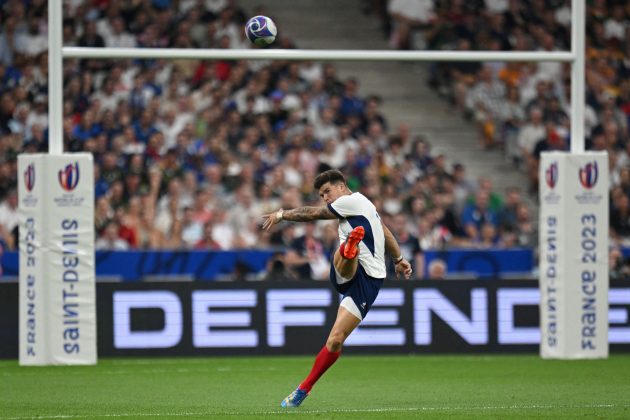Fiji v Portugal was the match of the Rugby world Cup pool stage. Two teams who wanted to play rugby, who wanted to keep ball in hand, and who wanted to attack from anywhere in a spirit that we’re told all rugby matches before 2000s were played in. It’s predictably elicited calls of “why don’t [insert uninspiring team name here] just play like Portugal?”
It was a great match and the kind that makes you fall in love with rugby all over again, if some of the lopsided victories in this group stage had dented that.
Related: Watch moment Portugal return to hero’s welcome
However, like a bucket of ice water, this is an article about how in the face of romance and delight, it’s pragmatism which has ultimately won out. And from here, everyone is gunning to win the World Cup.
Why pragmatism win the World Cup
For all that was great about Portugal’s victory on Sunday night, their style of play, and that of Fiji, was horribly inefficient. They combined for just under 1,300m carried but scored five tries. That they needed to carry for 260m per try is a failing rather than a figure to aim for. This game did mimic the games of the past in one crucial way though, it contained a huge amount of kicking – 67 in total. Three of Portugal’s forwards kicked as did two of Fijis. In fact, 20 players across the two teams kicked at least once, certainly a record for this World Cup and likely for any prior one as well.
Winnie the Pooh ends with Christopher Robin taking Winnie and the gang to Hundred Acre wood and telling him that he can no longer play with him as he is now too old. It’s heartbreaking but it’s also a parable for the growth of international teams.

Lomano Lemeki gets rid of the ball (Getty Images)
Japan and their frantic brilliance of 2015 gave way to a more measured, and more successful side in 2019. Fiji and their attack from anywhere approach took a backseat as they slowly applied pressure and ultimately broke Australia this tournament. Georgia are doing this in the opposite direction, taking a set-piece game plan and adding in some backline excitement.
This growth isn’t quite as devastating as Robin’s wood-based desertion. The current versions of France and Ireland are two of the best rugby teams I have ever seen. They apply pragmatism lightly; ensuring any mistakes they make are sufficiently far from their own line. But it doesn’t stand in the way of truly brilliant moments. Few could make a convincing case that Mathieu Jalibert kicking a perfect crossfield ball to Damien Penaud while in the grasp of Ignacio Brex was dull.
…but build on the fun rugby
The evolution of Portugal and Fiji won’t result in them becoming identikit and dull. It’ll result in them winning more games as they harness the best parts of their game and remove the worst.

Iosefo Masi of Fiji breaks (Getty Images)
Portugal were competitive in every match but won only once. Although Fiji have made the quarter-finals for the first time since 2007, they have also suffered defeat to the lowest ranked team in their group in two consecutive tournaments. That style of play has made them the people’s champions, but it’s likely to come unstuck against England, public enemy number one, a team even their own fans are struggling to support.
If the bookies are right, it will be Wales, England, France, and Ireland who will be victorious on the weekend. Four teams who play in four very different ways but all agree that possession should only be ceded on your terms.
It’s led them to unblemished World Cup records. Certainly in the case of France or Ireland you couldn’t claim that they are boring to watch. But crucially, they have that pragmatic streak required to win the World Cup. If Portugal, and particularly Fiji, find that then the rest of the rugby world should rightly be very worried.
Download the digital edition of Rugby World straight to your tablet or subscribe to the print edition to get the magazine delivered to your door.





